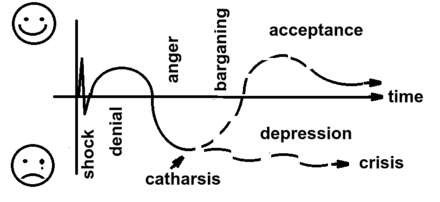The 5 Stages of Grief
Curated from: psychcentral.com
Ideas, facts & insights covering these topics:
9 ideas
·5.4K reads
19
Explore the World's Best Ideas
Join today and uncover 100+ curated journeys from 50+ topics. Unlock access to our mobile app with extensive features.
The Kübler-Ross Model of Grieving
Grief comes in many forms and everyone has experienced it in many different ways, but this model theory is only a reference, not a rule. The five stages of grief are:
- Denial
- Anger
- Bargaining
- Depression
- Acceptance.
The five stages of grief were once known as the five stages of death, however, Elisabeth Kübler-Ross, the Swiss American psychiatrist that invented this theory extended her model to many different kinds of losses.
183
1.16K reads
Denial
This is a common defense mechanism that buffers the immediate shock felt during unexpected situations. We may often fantasize about the untruths and hope that the news we've received isn't real.
After the first reaction of shock and denial, you may go numb for a while. You could feel like nothing matters to you anymore and life as you once knew it has changed. It may be difficult to feel you can move on, but once you've gained enough courage to face the truth, your healing journey will begin.
149
562 reads
Anger
Pain takes shape in many different forms and often redirected or expressed as anger. A lot of people reject this feeling because of its intensity and sometimes because of their culture.
During this stage of grief, there is a possibility that you may lash out at other people, objects, yourself, or life in general. However, try to remind yourself that underneath the anger that you're feeling is pain and is a part of the healing process.
152
659 reads
Bargaining
This is the stage of grieving where you try to find a way to hold on to hope in order to cope with intense pain; where we are willing to do anything and sacrifice everything just so that things could go back to the way they were.
Often in this situation we also tend to think about the things we could have done differently, but what's happened has happened, and that will not remove the guilt we feel. It's also a part of healing where we confront the reality of our losses.
152
473 reads
Depression
We're not referring to clinical depression in this instance when talking about depression, but as a natural and appropriate response to grief.
When we begin to face the reality of our situation, it is not inevitable to feel instense sadness and despair. We could also experience fatigue, unwillingness to move on, loss of appetite, or not being able to enjoy the things you once did. This is also a part of our healing journey.
153
905 reads
Acceptance
Acceptance is not about being okay with what happened, rather it is about acknowledging the loss and learning to live with it, and readjusting our lives accordingly.
Depending on your experience, it is quite understandable if ever you do not feel this way. Sometimes you will find yourself stationed at this feeling and then later feel another stage of grief. This back-and-forth is a natural part of the healing process.
159
499 reads
Misconceptions about grieving
Many people believe that there is a right and wrong way to grieve, but in reality, there isn't. Grieving isn't about following a list of steps and then getting over the situation right after. It's a unique journey and is experienced differently by everyone, some might go through every phase while others don't.
There is no specific order to grieve and if ever that you find yourself falling into the deep end and developing clinical depression, it's time to reach out to a professional.
154
394 reads
Reaching out for help during grief
- It is important to express your needs to trusted people such as your friends or family members. Allow them to help you in the ways you feel will best suit your needs;
- There are support groups that have gone through the same thing as you have and these are safe spaces where you can freely express your grief without the feeling of pressure; and
- Grief counsellors are professionals that can support your grieving process; this applies to therapists as wll.
144
334 reads
Helping someone who is grieving
- The best support comes from just being there and making it clear that you’re available to listen to the things they want to share with you;
- It can be frigthening to message someone who is grieving and check up on them, but don't let fear stop you from showing empathy;
- Try to lift some of the weight off of their shoulders. Explore the areas they might need help managing while they process their loss.
- Wait for them to express how they feel instead of assuming that they're ready to talk about it.
150
406 reads
IDEAS CURATED BY
Nathaniel N.'s ideas are part of this journey:
Learn more about psychology with this collection
Practicing empathy in relationships and communication
Understanding the importance of balance in personal and professional life
Defining your path in life
Related collections
Similar ideas
4 ideas
5 ideas
Intermittent Fasting for Real People: Practical Tips
healthline.com
1 idea
Anxiety: Causes, Symptoms, Treatment, and More
healthline.com
Read & Learn
20x Faster
without
deepstash
with
deepstash
with
deepstash
Personalized microlearning
—
100+ Learning Journeys
—
Access to 200,000+ ideas
—
Access to the mobile app
—
Unlimited idea saving
—
—
Unlimited history
—
—
Unlimited listening to ideas
—
—
Downloading & offline access
—
—
Supercharge your mind with one idea per day
Enter your email and spend 1 minute every day to learn something new.
I agree to receive email updates

